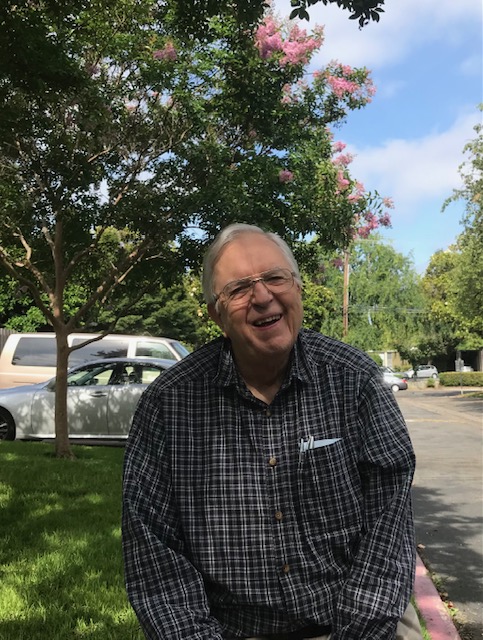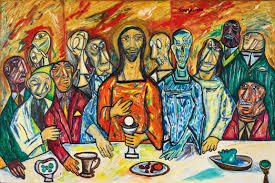
Caricature of Leonardo D'Vinci's Last Supper

In recent months our home Bible class has been studying the Gospel of Matthew a full chapter or more per week. This is my way to show my disdain for boring preachers who spend forty five minutes expounding one verse. Years ago in London Ray Stedman took me to hear a famous expositor specializing in Romans. The man was well known, but I was keenly disappointed, for nearly an hour he elaborated on the phrase, “I beseech you therefore brethren.” I wanted him to cover way more:
"I beseech you therefore, brethren, by the mercies of God, that you present your bodies a living sacrifice, holy, acceptable to God, which is your reasonable service. And do not be conformed to this world, but be transformed by the renewing of your mind, that you may prove what is that good and acceptable and perfect will of God. For I say, through the grace given to me, to everyone who is among you, not to think of himself more highly than he ought to think, but to think soberly, as God has dealt to each one a measure of faith.“ (Romans 12:1-3) — at least.
This week we were with Jesus in Jerusalem midweek after the cleansing of the temple and the Olivet Discourse. It was time to talk about the Last Supper (Matthew 26). We were only able to cover 36 verses.
Now it came to pass, when Jesus had finished all these sayings, that He said to His disciples, “You know that after two days is the Passover, and the Son of Man will be delivered up to be crucified.” Then the chief priests, the scribes, and the elders of the people assembled at the palace of the high priest, who was called Caiaphas, and plotted to take Jesus by trickery and kill Him. But they said, “Not during the feast, lest there be an uproar among the people.”
And when Jesus was in Bethany at the house of Simon the leper, a woman came to Him having an alabaster flask of very costly fragrant oil, and she poured it on His head as He sat at the table. But when His disciples saw it, they were indignant, saying, “Why this waste? “For this fragrant oil might have been sold for much and given to the poor.” But when Jesus was aware of it, He said to them, “Why do you trouble the woman? For she has done a good work for Me. “For you have the poor with you always, but Me you do not have always. “For in pouring this fragrant oil on My body, she did it for My burial. “Assuredly, I say to you, wherever this gospel is preached in the whole world, what this woman has done will also be told as a memorial to her.”
Then one of the twelve, called Judas Iscariot, went to the chief priests and said, “What are you willing to give me if I deliver Him to you?” And they counted out to him thirty pieces of silver. So from that time he sought opportunity to betray Him.
First we talked about the sinister plot by the religious leaders of the day to kill Jesus and the dinner at the house of Simon, a former leper and the costly perfume poured out on the head of Jesus. By today’s standard perhaps it was worth perhaps a hundred dollars.
Next we talked about the thirty pieces of silver the priests paid Judas to betray him. There are 31.1035 grams per troy ounce. At spot valuation of $28/oz in 2021, 30 "pieces of silver" would be worth approximately $91 to $441 in present-day value (USD) depending on which coin was used. The standard that came to be most commonly used was the Athenian or Attic one, which weighed a little over 4.3 grams. A drachma was approximately a day's pay for a skilled laborer. So 30 pieces of silver (30 tetradrachm), at four drachmas each, would roughly be comparable to four months' (120 days) wages. In Exodus 21:32, 30 pieces of silver was the price of a slave Wikipedia. This exact amount had been predicted by the prophet Zechariah five hundred years earlier.
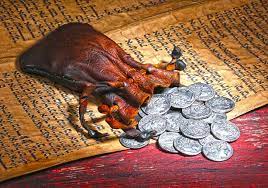
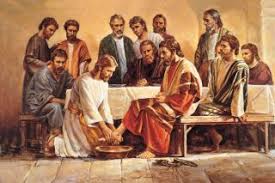
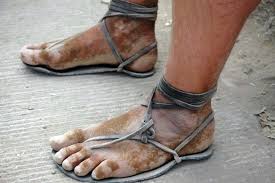 First Jesus washed the feet of the disciples. Wearing only sandals, walking all day on dusty roads, and on the streets of Jerusalem, everyone had dirty feet. Ordinarily a low servant would wash feet as a courtesy. Jesus stooped down to serve. "For even the Son of Man did not come to be served, but to serve, and to give His life a ransom for many." (Mark 10:45)
First Jesus washed the feet of the disciples. Wearing only sandals, walking all day on dusty roads, and on the streets of Jerusalem, everyone had dirty feet. Ordinarily a low servant would wash feet as a courtesy. Jesus stooped down to serve. "For even the Son of Man did not come to be served, but to serve, and to give His life a ransom for many." (Mark 10:45)
Paintings of the Last Supper usually show everyone seated at a table with chairs. In those days guests sat around a U-shaped low couch, reclining. With legs folded, each person leaned left or right. If the host was seated at the group he could lean left or right. Jesus probably leaned right in close proximity to his youngest disciple, John. Judas may well have been seated to the left of Jesus. Dinner was in the center where everyone could break a piece of bread from a common loaf, dipping it in the common pot. As soon as Judas had left, Jesus passed a common cup of wine around the table, and broke the single loaf of bread, distributing it to the Eleven.
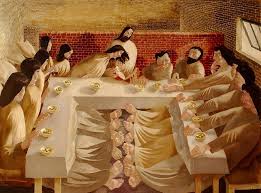
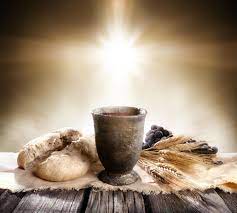
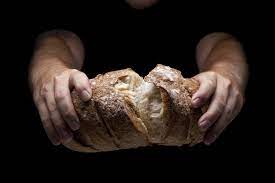
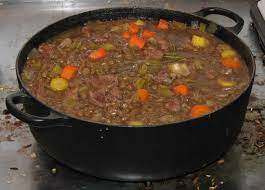
During his life, Ray Stedman taught through only the gospels of Mark and John. His expository study of this portion of Mark is below. Our home class next had a lengthy discussion about the meaning of communion today. We also talked at length about the Roman Catholic Mass and the contrast seen in the simple communion services for 500 years, in the Protestant tradition. This was a very rich discussion which will be discussed separately, God willing.
We also talked about the virgin birth of Jesus, his genealogy, and the "Seed of the Woman."
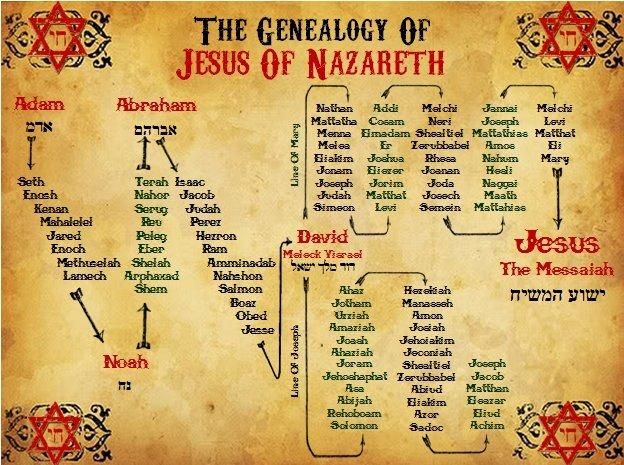
Bible Commentary on The Last Supper:
The following is Bible commentary by Matthew Henry on the last supper of Christ with disciples from the book of Matthew, chapter 26:
The Passover Verses 17-25 ~ Observe, the place for their eating the Passover was pointed out by Christ to the disciples. He knows those hidden ones who favor his cause, and will graciously visit all who are willing to receive him. The disciples did as Jesus had appointed. Those who would have Christ's presence in the gospel Passover must do what he says. It well becomes the disciples of Christ always to be jealous over themselves, especially in trying times. We know not how strongly we may be tempted, nor how far God may leave us to ourselves, therefore we have a reason not to be high-minded, but to fear. Heart-searching examination and fervent prayer are especially proper before the Lord's supper, that, as Christ our Passover is now sacrificed for us, we may keep this feast, renewing our repentance, our faith in his blood, and surrendering ourselves to his service.
Christ institutes his holy supper Verses 26-30 ~ This ordinance of the Lord's supper is to us the Passover supper, by which we commemorate a much greater deliverance than that of Israel out of Egypt. Take, eat; accept of Christ as he is offered to you; receive the atonement, approve of it, submit to his grace, and his government. The meat looked upon, be the dish ever so well garnished, will not nourish; it must be fed upon: so must the doctrine of Christ. This is my body; that is, spiritually, it signifies and represents his body. We partake of the sun, not by having the sun put into our hands, but the beams of it darted down upon us; so we partake of Christ by partaking of his grace, and the blessed fruits of the breaking of his body. The blood of Christ is signified and represented by the wine. He gave thanks, to teach us to look to God in every part of the ordinance. This cup he gave to the disciples with a command, Drink ye all of it. The pardon of sin is that great blessing which is, in the Lord's supper, conferred on all true believers; it is the foundation of all other blessings. He takes leave of such communion; and assures them of a happy meeting again at last; "Until that day when I drink it new with you", may be understood of the joys and glories of the future state, which the saints shall partake with the Lord Jesus. That will be the kingdom of his Father; the wine of consolation will there be always new. While we look at the outward signs of Christ's body broken and his blood shed for the remission of our sins, let us recollect that the feast cost him as much as though he had literally given his flesh to be eaten and his blood for us to drink.
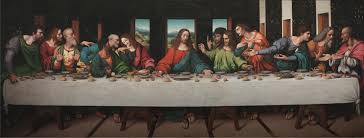

| Matthew 26:17-30 | Mark 14:12-25 | Luke 22:7-23 |
17 On the first day of the Festival of Unleavened Bread, the disciples came to Jesus and asked, “Where do you want us to make preparations for you to eat the Passover?” 18 He replied, “Go into the city to a certain man and tell him, ‘The Teacher says: My appointed time is near. I am going to celebrate the Passover with my disciples at your house.’ ” 19 So the disciples did as Jesus had directed them and prepared the Passover. 20 When evening came, Jesus was reclining at the table with the Twelve. 21 And while they were eating, he said, “Truly I tell you, one of you will betray me.” 22 They were very sad and began to say to him one after the other, “Surely you don’t mean me, Lord?” 23 Jesus replied, “The one who has dipped his hand into the bowl with me will betray me. 24 The Son of Man will go just as it is written about him. But woe to that man who betrays the Son of Man! It would be better for him if he had not been born.” 25 Then Judas, the one who would betray him, said, “Surely you don’t mean me, Rabbi?” Jesus answered, “You have said so.”26 While they were eating, Jesus took bread, and when he had given thanks, he broke it and gave it to his disciples, saying, “Take and eat; this is my body.” 27 Then he took a cup, and when he had given thanks, he gave it to them, saying, “Drink from it, all of you. 28 This is my blood of the covenant, which is poured out for many for the forgiveness of sins. 29 I tell you, I will not drink from this fruit of the vine from now on until that day when I drink it new with you in my Father’s kingdom.” 30 When they had sung a hymn, they went out to the Mount of Olives.
Commentaries for Matthew 26:17-30 |
12 On the first day of the Festival of Unleavened Bread, when it was customary to sacrifice the Passover lamb, Jesus’ disciples asked him, “Where do you want us to go and make preparations for you to eat the Passover?” 13 So he sent two of his disciples, telling them, “Go into the city, and a man carrying a jar of water will meet you. Follow him. 14 Say to the owner of the house he enters, ‘The Teacher asks: Where is my guest room, where I may eat the Passover with my disciples?’ 15 He will show you a large room upstairs, furnished and ready. Make preparations for us there.” 16 The disciples left, went into the city and found things just as Jesus had told them. So they prepared the Passover. 17 When evening came, Jesus arrived with the Twelve. 18 While they were reclining at the table eating, he said, “Truly I tell you, one of you will betray me—one who is eating with me.” 19 They were saddened, and one by one they said to him, “Surely you don’t mean me?” 20 “It is one of the Twelve,” he replied, “one who dips bread into the bowl with me. 21 The Son of Man will go just as it is written about him. But woe to that man who betrays the Son of Man! It would be better for him if he had not been born.” 22 While they were eating, Jesus took bread, and when he had given thanks, he broke it and gave it to his disciples, saying, “Take it; this is my body.” 23 Then he took a cup, and when he had given thanks, he gave it to them, and they all drank from it. 24 “This is my blood of the covenant, which is poured out for many,” he said to them. 25 “Truly I tell you, I will not drink again from the fruit of the vine until that day when I drink it new in the kingdom of God.”
Commentaries for Mark 14:12-25 |
7 Then came the day of Unleavened Bread on which the Passover lamb had to be sacrificed. 8 Jesus sent Peter and John, saying, “Go and make preparations for us to eat the Passover.” 9 “Where do you want us to prepare for it?” they asked. 10He replied, “As you enter the city, a man carrying a jar of water will meet you. Follow him to the house that he enters, 11 and say to the owner of the house, ‘The Teacher asks: Where is the guest room, where I may eat the Passover with my disciples?’ 12He will show you a large room upstairs, all furnished. Make preparations there.” 13 They left and found things just as Jesus had told them. So they prepared the Passover. 14 When the hour came, Jesus and his apostles reclined at the table. 15And he said to them, “I have eagerly desired to eat this Passover with you before I suffer. 16 For I tell you, I will not eat it again until it finds fulfillment in the kingdom of God.” 17 After taking the cup, he gave thanks and said, “Take this and divide it among you. 18 For I tell you I will not drink again from the fruit of the vine until the kingdom of God comes.” 19 And he took bread, gave thanks and broke it, and gave it to them, saying, “This is my body given for you; do this in remembrance of me.”20 In the same way, after the supper he took the cup, saying, “This cup is the new covenant in my blood, which is poured out for you. 21 But the hand of him who is going to betray me is with mine on the table. 22 The Son of Man will go as it has been decreed. But woe to that man who betrays him!” 23 They began to question among themselves which of them it might be who would do this. Commentaries for Luke 22:7-23
|
13:1 Now before the Feast of the Passover, when Jesus knew that His hour had come that He should depart from this world to the Father, having loved His own who were in the world, He loved them to the end. 2 And supper being ended, the devil having already put it into the heart of Judas Iscariot, Simon’s son, to betray Him, 3 Jesus, knowing that the Father had given all things into His hands, and that He had come from God and was going to God, 4 rose from supper and laid aside His garments, took a towel and girded Himself. 5 After that, He poured water into a basin and began to wash the disciples’ feet, and to wipe them with the towel with which He was girded. >6 Then He came to Simon Peter. 7 Jesus answered and said to him, “What I am doing you do not understand now, but you will know after this.” 8 Peter said to Him, “You shall never wash my feet!” Jesus answered him, “If I do not wash you, you have no part with Me.” 9 Simon Peter said to Him, “Lord, not my feet only, but also my hands and my head!” 10 Jesus said to him, “He who is bathed needs only to wash his feet, but is completely clean; and you are clean, but not all of you.” 11 For He knew who would betray Him; therefore He said, “You are not all clean.” 12 So when He had washed their feet, taken His garments, and sat down again, He said to them, “Do you know what I have done to you? 13 You call Me Teacher and Lord, and you say well, for so I am. 14 If I then, your Lord and Teacher, have washed your feet, you also ought to wash one another’s feet. 15 For I have given you an example, that you should do as I have done to you. 16 Most assuredly, I say to you, a servant is not greater than his master; nor is he who is sent greater than he who sent him. 17 If you know these things, blessed are you if you do them. 18 “I do not speak concerning all of you. I know whom I have chosen; but that the Scripture may be fulfilled, ‘He who eats bread with Me has lifted up his heel against Me.’ 19 Now I tell you before it comes, that when it does come to pass, you may believe that I am He. 20 Most assuredly, I say to you, he who receives whomever I send receives Me; and he who receives Me receives Him who sent Me.” 21 When Jesus had said these things, He was troubled in spirit, and testified and said, “Most assuredly, I say to you, one of you will betray Me.” 22 Then the disciples looked at one another, perplexed about whom He spoke. 23 Now there was leaning on Jesus’ bosom one of His disciples, whom Jesus loved. 24 Simon Peter therefore motioned to him to ask who it was of whom He spoke. 25 Then, leaning back on Jesus’ breast, he said to Him, “Lord, who is it?” 26 Jesus answered, “It is he to whom I shall give a piece of bread when I have dipped it.” And having dipped the bread, He gave it to Judas Iscariot, the son of Simon. 27 Now after the piece of bread, Satan entered him. Then Jesus said to him, “What you do, do quickly.” 28 But no one at the table knew for what reason He said this to him. 29 For some thought, because Judas had the money box, that Jesus had said to him, “Buy those things we need for the feast,” or that he should give something to the poor. 30 Having received the piece of bread, he then went out immediately. And it was night. 31 So, when he had gone out, Jesus said, “Now the Son of Man is glorified, and God is glorified in Him. 32 If God is glorified in Him, God will also glorify Him in Himself, and glorify Him immediately. 33 Little children, I shall be with you a little while longer. You will seek Me; and as I said to the Jews, ‘Where I am going, you cannot come,’ so now I say to you. 34 A new commandment I give to you, that you love one another; as I have loved you, that you also love one another. 35 By this all will know that you are My disciples, if you have love for one another.” 36 Simon Peter said to Him, “Lord, where are You going?” Jesus answered him, “Where I am going you cannot follow Me now, but you shall follow Me afterward.” 37 Peter said to Him, “Lord, why can I not follow You now? I will lay down my life for Your sake.” 38 Jesus answered him, “Will you lay down your life for My sake? Most assuredly, I say to you, the rooster shall not crow till you have denied Me three times. 14:1 “Let not your heart be troubled; you believe in God, believe also in Me. 2 In My Father’s house are many mansions; if it were not so, I would have told you. I go to prepare a place for you. 3 And if I go and prepare a place for you, I will come again and receive you to Myself; that where I am, there you may be also. 4 And where I go you know, and the way you know.” 5 Thomas said to Him, “Lord, we do not know where You are going, and how can we know the way?” 6 Jesus said to him, “I am the way, the truth, and the life. No one comes to the Father except through Me. 7 “If you had known Me, you would have known My Father also; and from now on you know Him and have seen Him.” 8 Philip said to Him, “Lord, show us the Father, and it is sufficient for us.” 9 Jesus said to him, “Have I been with you so long, and yet you have not known Me, Philip? He who has seen Me has seen the Father; so how can you say, ‘Show us the Father’? 10 Do you not believe that I am in the Father, and the Father in Me? The words that I speak to you I do not speak on My own authority; but the Father who dwells in Me does the works. 11 Believe Me that I am in the Father and the Father in Me, or else believe Me for the sake of the works themselves. 12 “Most assuredly, I say to you, he who believes in Me, the works that I do he will do also; and greater works than these he will do, because I go to My Father. 13 And whatever you ask in My name, that I will do, that the Father may be glorified in the Son. 14 If you ask anything in My name, I will do it. 15 “If you love Me, keep My commandments. 16 And I will pray the Father, and He will give you another Helper, that He may abide with you forever— 17 the Spirit of truth, whom the world cannot receive, because it neither sees Him nor knows Him; but you know Him, for He dwells with you and will be in you. 18 I will not leave you orphans; I will come to you. 19 “A little while longer and the world will see Me no more, but you will see Me. Because I live, you will live also. 20 At that day you will know that I am in My Father, and you in Me, and I in you. 21 He who has My commandments and keeps them, it is he who loves Me. And he who loves Me will be loved by My Father, and I will love him and manifest Myself to him.” 22 Judas (not Iscariot) said to Him, “Lord, how is it that You will manifest Yourself to us, and not to the world?” 23 Jesus answered and said to him, “If anyone loves Me, he will keep My word; and My Father will love him, and We will come to him and make Our home with him. 24 He who does not love Me does not keep My words; andthe word which you hear is not Mine but the Father’s who sent Me. 25 “These things I have spoken to you while being present with you. 26 Butthe Helper, the Holy Spirit, whom the Father will send in My name, He will teach you all things, and bring to your remembrance all things that I said to you. 27 Peace I leave with you, My peace I give to you; not as the world gives do I give to you. Let not your heart be troubled, neither let it be afraid. 28 You have heard Me say to you, ‘I am going away and coming back to you.’ If you loved Me, you would rejoice because I said, ‘I am going to the Father,’ forMy Father is greater than I. 29 “And now I have told you before it comes, that when it does come to pass, you may believe. 30 I will no longer talk much with you, for the ruler of this world is coming, and he has nothing in Me. 31 But that the world may know that I love the Father, and as the Father gave Me commandment, so I do. Arise, let us go from here. |
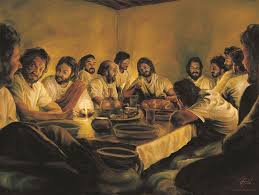
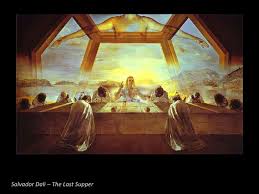
Mark brings together certain events and themes which occurred at various times during this week and deliberately places them side by side so that we might see the contrast in certain emphases. Like an artist, he draws together two lines of truth, taking that line of thought which centers around hate, and that which centers around love, and braiding them together. In Verses 1 and 2 you have Mark's account of the hatred of the priests toward Jesus, followed by the story of the love toward him of Mary of Bethany. Then in Verses 10 and 11 you come to the story of Judas' mounting hatred and enmity against Jesus, followed by the story of Jesus' love for his disciples, as exhibited at their last Passover together, and the mingling together of these two themes in the disclosure by Jesus of the betrayal of Judas at the table of the Lord.
Let us open with the words which set forth the hatred of the priests:
It was now two days before the Passover and the feast of Unleavened Bread. And the chief priests and the scribes were seeking how to arrest him by stealth, and kill him; for they said, "Not during the feast, lest there be a tumult of the people." (Mark 14:1-2 RSV)
These priests are aware, as Mark makes known here, that time is growing short, that if they are going to act, they must act now. The days of the Passover and the Feast of the Unleavened Bread are at hand. Josephus, the Jewish historian, tells us that at these Passover feasts there were sometimes as many as three million people in Jerusalem and the surrounding villages, pilgrims from all parts of the earth. The Passover could be celebrated only in Jerusalem, so the city was thronged with strangers from various parts of the world. The chief priests and scribes know that if they take Jesus at the height of the feast, they are apt to incite a riot; so they want to act beforehand. As there are only two days left, there is a deep sense of urgency about their malevolent threat. This is always characteristic of hatred. Hatred can never wait. Hatred must act as soon as an opportunity affords.
Mark makes clear, too, that these priests were motivated by a sense of threat to their own position. Why did they want to kill Jesus? Because his system of teaching and his whole style of living was a threat to them. They were trying to pose as God's men, religious men, men whose interests and concerns were to relieve the distress and suffering of others. But when Jesus taught, he exposed them, cut through their hypocrisy and showed what liars they were. This threatened them, so they were out to get him.
Mark shows us also that there is a deep sense of secrecy on their part. They have to move by stealth, have to take him in secrecy. This also is always characteristic of hatred. Hatred moves behind the scenes, does not come out into the open if it can help it. In sharp contrast to this, Mark gives us the account of what took place in Bethany. It actually took place a few days before this, for John tells us it was six days before the Passover. Mark is simply recounting it, not in chronological order, but as something he sets in contrast with the hatred of the priests. It is the story of the love of Mary of Bethany:
And while he was at Bethany in the house of Simon the leper, as he sat at table, a woman came with an alabaster jar of ointment of pure nard, vary costly, and she broke the jar and poured it over his head. But there were some who said to themselves indignantly, "Why was the ointment thus wasted? For this ointment might have been sold for more than three hundred denarii, and given to the poor." And they reproached her. But Jesus said, "Let her alone; why do you trouble her? She has done a beautiful thing to me. For you always have the poor with you, and whenever you will, you can do good to them; but you will not always have me. She has done what she could; she has anointed my body beforehand for burying. And truly, I say to you, wherever the gospel is preached in the whole world, what she has done will be told in memory of her." (Mark 14:3-9 RSV)
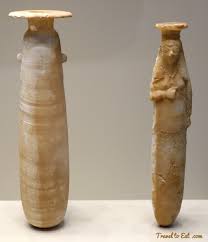 Here we have a wonderful account of the love of this woman. Mark does not give her name, but John tells us it was Mary the sister of Martha and Lazarus, who seized this occasion to anoint the head of Jesus There are three movements in this brief account.
Here we have a wonderful account of the love of this woman. Mark does not give her name, but John tells us it was Mary the sister of Martha and Lazarus, who seized this occasion to anoint the head of Jesus There are three movements in this brief account.
The first is the act of loving sacrifice. You can picture it in your imagination: Mary coming into the room with the jar of expensive ointment as Jesus is reclining on the couch. John tells us that she anointed both his head and his feet, which were both easily accessible to her as he lay, oriental fashion, on the couch beside the table. She breaks the jar and pours the whole contents upon his head and feet, anointing him. It is a beautiful act, one which captures the attention of all those present.
And, second, it awakened a response. Mark tells us the first response was one of indignation that she should waste this ointment so. John says it was Judas who raised this objection. This is characteristic of Judas -- that he was concerned only about the waste of money. John says he was a thief. He had been appointed treasurer for the disciples -- not because he was a thief, but because he was good at money. Nevertheless he became a thief as a result. There are always people who try to place a monetary value on things. They seem to know the price of everything, but the value of nothing. In this account, Jesus is warning us of the foolishness of that attitude, for if you look at the world only in terms of dollars and cents, you are going to miss three-quarters of life. This is what he wants to teach us here.
Now, third, our Lord takes this beautiful incident and shows us the true value of it. He says five things about it which mark it an extremely valuable act. First he says, "She has done a beautiful thing to me." The beauty of it lay in its very extravagance. This woman did not spare any of the ointment but broke the flask and poured the whole quantity out upon him. Now, it was costly ointment. Judas, with his practical, computer mind, reckoned it up as worth three hundred denarii. A denarius was the day's wage for a laborer. In these inflated times, three hundred days' wages would be a tremendous sum -- probably at least $10,000. But in those days, a denarius was worth about 20 cents, so that would make this ointment worth approximately $60.00 -- almost a year's wages. In the eyes of Judas, this woman wasted an enormous amount of money when she poured out the ointment upon Jesus. It was such a lavish act, and therein lay the beauty of it. Jesus said, "That's beautiful! She hasn't held anything back, but has simply poured it all out. It's a beautiful thing she has done to me."
Second, he said that it was a timely thing she had done. "It was something that could only be done now. Anytime you want to do good to the poor you can, because they are always around." And it is right to help the poor. But there are opportunities which come in our life which must be seized at the moment; they never happen again. Mary had sensed this and had seized the moment to do this which could only have been done then, for such a time would never occur again. It was out of the sensitivity of her heart that she realized that the timing was right, and Jesus recognized this.
Then, she did that which was feasible. That is, she did what she could. It was all that was open to her. She could not fix him a meal; there was no time for that. She could not make a garment for him; there was no time for that. There was nothing else she could do to show her love but this, and so this is what she did. She did what she could. I like that. I am sure our Lord has called our attention to it because it is so practical for us. Someone has said, "I'm only a man, but I am a man. I can't do everything, but I can do something. And what I can do I ought to do. And what I ought to do, I'm available to do."
This is really the attitude the Lord asks of all of us. You cannot do everything. You cannot feed the starving world, but you can feed one person. You cannot comfort all the lonely hearts on earth, but you can comfort one or two. And Mary did what she could. Everywhere in Scripture, this is all God asks of us -- that we bring him what is at hand. Some of you think that you live dull lives, and that you never have an opportunity for real service. But you do! This is what this story tells us. You have something that you can do today. And in doing it with the expectation that God will take it and enlarge it, you will find that tremendous results can follow. We are to bring our loaves and fishes -- a simple little meal -- and Jesus will feed the multitude. We must fill the jars with water, but he will turn it into wine. When we do what we can, with this expectation that God will use it, what a beautiful expression it is!
The fourth element of this act was that it was insightful. Our Lord says, "She has anointed my body beforehand for burying." It is interesting to go through the Gospel accounts and note the many times Jesus said to these disciples that he was going to die. Over and over again he informed them that he was heading for death. Not one of them believed him -- except Mary of Bethany. She believed him, and understood that he was here for that very purpose. This was what motivated her. She understood that he was heading for burial. And just as love would long to do some act of service for him since she could not be sure she would ever have the opportunity later to find his body and anoint it for burial in the Jewish custom, she did it now. I think it is clear from this account that Jesus knew she did this deliberately for that very purpose. What a comfort this must have been to our Lord! Of all these friends who were around him at this time, only this one had the sensitivity of heart to understand what was happening. There is nothing more comforting to us than to be understood in what we are trying to do. How she must have ministered to him by this understanding act!
Finally, what she did was deserving of being remembered. It was memorable. Jesus said, "The story of this beautiful act will be told in memory of her wherever the gospel is preached in the whole world." Here we are today, 2000 years later, fulfilling this very word, telling again of the act of Mary of Bethany, when she anointed our Lord's head and feet. Those elements constitute what Jesus called, "the beautiful thing she has done to me."
Immediately in contrast to that is the hatred of Judas:
Then Judas Iscariot, who was one of the twelve, went to the chief priests in order to betray him to them. And when they heard it they were glad, and promised to give him money. And he sought an opportunity to betray him. (Mark 14:10-11 RSV)
This is probably one of the saddest portions of the record of Judas, this shabby moment when he went to the high priests deliberately intending to find an occasion to betray the Lord. There are some scholars today who try to excuse Judas. They say that he was merely misled. He expected Christ to usher in the Kingdom, and had this program in view for him. And since Jesus did not act in line with that, Judas was simply trying to force his hand. And though he was mistaken, nevertheless he was not evil-intentioned. But this account refutes that. He went deliberately to the high priests -- took the initiative -- with the intention of betraying his Lord. Mark highlights it with these words; "he was one of the twelve." He was of the inner circle, the ones upon whom Jesus leaned and depended, and yet he went to betray his Lord.
He did it, Mark says, because of greed and covetousness. Here again is that sense of urgency which hatred always exhibits. It has got to be done quickly. And because it is evil, it has to be done in secret as well. He went in secret. motivated by a deep sense of greed. If we put all the gospel accounts together we can see that he had a little scheme of his own. He had been stealing from the treasury in order to purchase for himself a piece of land that would be his when he came into the Kingdom. He needed a little more money, just thirty pieces of silver, and it was for that he bargained with the priests in order to complete his purchase. So it was nothing but common, ordinary greed that drove Judas to this act of betrayal. He went deliberately, coldly, intending to work it out that way.
Once again, now, Mark brings in the thread of the theme of love. In this closing account of this section, he shows us the love of Jesus as he brings about this last Passover feast. Again there are three movements; first, the preparation for the Passover, beginning in Verse 12:
And on the first day of Unleavened Bread, when they sacrificed the passover lamb, his disciples said to him, "Where will you have us go and prepare for you to eat the passover?" And he sent two of his disciples, and said to them, "Go into the city, and a man carrying a large jar of water will meet you; follow him, and wherever he enters, say to the householder, 'The Teacher says, Where is my guest room, where I am to eat the passover with my disciples?' And he will show you a large upper room furnished and ready; there prepare for us." And the disciples set out and went to the city, and found it as he had told them; and they prepared the passover. (Mark 14:12-16 RSV)
Again, just as in the case of the arrangements regarding the donkey he rode into Jerusalem, I do not think we need to read anything miraculous into this signal Jesus gave his disciples as to how to find the upper room. These both were prearranged, preparations he had worked out in advance. But there is significance in them, because he deliberately planned that this should be the signal. He said, "When you go into the city, you will find a man carrying a jar of water." Now, that would stand out (like a man today carrying a purse on his arm), for this was woman's work. Only women carried jars of water on their heads. A man might consent to carry a skin of water, but not a jar. Jars belonged to women. They had their divisions of labor in those days, just as we have today. And I suppose the Women's Libbers were just as upset about it then as they are today. He told them, "You won't have any difficulty, because you will find a man carrying a jar of water; follow him." And they found it to be just as he said.
Why did he use this symbol? I cannot read this without being convinced that our Lord arranged it this way because he wanted to say something by it. God's symbols always have meaning, if we know how to understand and read them. Here is something he is saying to them, and we do not need even to guess at it. The Scriptures tell us what this symbol meant:
There is another feast of the Jews which centers around the carrying of a jar of water by a man. It is referred to in John's gospel. In the seventh chapter of John, Jesus stood up at that feast and said to the whole crowd, "If anyone thirst, let him come to me and drink. He who believes in me, as the scripture has said, 'Out of his heart shall flow rivers of living water,'" (John 7:37-38 RSV). I think this is what he is saying here to his disciples: "Where we are going you don't understand. Although some of the symbolism of this feast of the passover lamb is known to you, there are other elements of it that you do not know. But follow me, and out of your hearts shall flow rivers of living water."
Then we come to the second movement, the upper room itself:
And when it was evening he came with the twelve. And as they were at table eating, Jesus said, "Truly, I say to you, one of you will betray me, one who is eating with me." They began to be sorrowful, and to say to him one after another, "Is it I?" He said to them, "It is one of the twelve, one who is dipping bread in the same dish with me. For the Son of man goes as it is written of him, but woe to that man by whom the Son of man is betrayed! It would have been better for that man if he had not been born." (Mark 14:17-21 RSV)
I think our imagination of this occasion, the initiation of the Lord's last supper, is often misled by the painting by Leonardo d' Vinci. We have seen that painting so often that we imagine these men gathered around the table as d' Vinci pictured it. In fact, as someone has said, it looks as though Jesus had just said to them, "All you fellows who want to get into the picture, come over on this side of the table!" But that is not the way it was. They were not seated around the table, and they certainly were not seated on just three sides of the table. They were lying on couches around a low table, in the Roman custom, which the Jews of this time also observed. In that arrangement, the head of John the disciple lay close to the breast of Jesus. But on the other side of Jesus, equally close to him, was Judas, so that the head of Jesus lay near the breast of Judas. This must have been the arrangement, in order to allow for the interchange that went on at the Lord's table. When Jesus said, "It is one who is dipping bread in the same dish with me who is going to betray me," there were only two of the disciples who could have reached the same dish that Jesus used -- John and Judas. What he was saying to the other disciples was that it was one of those two.
And yet, forever to the credit of these disciples, when Jesus said, "It is one of you twelve who is going to betray me," not one of them said, "I know who it is; it's he." Instead, they looked at Jesus and said, "Lord, is it I?" Every one of us recognizes the feeling that there is something evil in us, something we do not trust, something we are not sure will not break out sometime and carry us into acts that appall us, deeds we are aghast at the thought of doing. Something of that self-distrust gripped these men at that moment, and they said, "Is it I?" But Jesus reassured them, said, "No, it's the one who is dipping his hand in the dish with me."
Other accounts tell us that shortly after this he said to Judas privately, "What you are about to do, go and do quickly." And Judas left the company. But before he left, Jesus said to these disciples, "The Son of man goes as it is written of him," i.e., it had been predicted that he would be betrayed by one of his own, and this was being fulfilled. But, and this is important to notice, Jesus also said, "Woe to that man by whom the Son of man is betrayed!" Woe to him! -- not because he is doing something he cannot help doing, because he could have helped it. Judas was not driven to betray the Lord; he chose to do so. This is why Jesus adds what are probably the most solemn words that ever fell from his lips: "It would have been better for that man if he had never been born." I do not think that any more fearful words ever came from the lips of Jesus. Wouldn't you hate to have him say that about you? But now, the last scene:
And as they were eating, he took bread. and blessed, and broke it, and gave it to them, and said, "Take; this is my body. "And he took a cup, and when he had given thanks he gave it to them, and they all drank of it. And he said to them, "This is my blood of the new covenant, which is poured out for many. Truly, I say to you, I shall not drink again of the fruit of the vine until that day when I drink it new in the kingdom of God." (Mark 14:22-25 RSV)
This obviously is symbolism. Our Lord is teaching again by means of symbols, but the symbols are very significant. He took the bread, and said, "This is my body," and he broke the bread, symbolizing how his body would be broken. And he took the cup, and said, "This is the blood of the new covenant," i.e., the new agreement that God makes with men by faith, and not by works; by believing, and not by performance. That is the New Covenant. Then he reminded them that this was the end, that he would never drink of the cup again until he drank it new in the fulfillment of the kingdom of God.
Now we can understand why Mark has put this account alongside the story of Mary of Bethany. For here our Lord is showing these disciples that he was doing to them what Mary had done to him. She brought a beautiful alabaster flask, and she broke it. He said, "My body is that flask, and I am going to be broken for you." She poured out of the flask all the ointment that was in it, so that the fragrance of it filled the room, as it has filled the earth in the centuries since. And Jesus said, "I will pour out of the flask of my body [what Peter calls 'the precious blood'], all of it, for you, that the fragrance of it may fill your life, and fill the whole earth."
Yesterday I saw the new film, The Hiding Place -- a wonderful film; do not miss it. It is one of the most powerfully moving films I have ever seen. In the midst of it is a scene set in the Ravensbruck concentration camp in Germany. Corrie Ten Boom and her sister Bessie are there, along with ten thousand other women, in the horribly degrading, hideous conditions of this camp. They are gathered with some of the women in the barracks in the midst of the beds, cold and hungry and lice-ridden, and Bessie is leading a Bible class. One of the other women calls out derisively from her bunk and mocks their worship of God. They fall into a conversation, and this woman says what so frequently is flung at Christians: "If your God is such a good God, why does he allow this kind of suffering?" Dramatically she tears off the bandages and old rags that bind her hands, displaying her broken, mangled fingers and says, "I'm the first violinist of the
We return to our studies in Mark, stepping again into the infinite mystery that always gathers around the events in the closing days of our Lord's earthly life, the scenes that lead to the cross. I am sure that the twenty-third Psalm, the Shepherd's Psalm, is the best-loved psalm of all. I know thousands of people who have been helped and strengthened by those opening words, "The Lord is my shepherd, I shall not want." The thought of the Lord as shepherd of his people -- watching over his flock, guarding them, protecting them, leading them into green pastures, making them to lie down beside the still water -- has comforted many of us, I know. I am sure that fulfilling this psalm was much in our Lord's thoughts as he gathered with his disciples in the upper room.
Mark indicates this by the words with which he describes the close of the supper and the progress of the Lord and his disciples on their way to Gethsemane, in Verse 26:
And when they had song a hymn, they went out to the Mount of Olives. And Jesus said to them, "You will all fall away; for it is written, 'I will strike the shepherd, and the sheep will be scattered.' But after I am raised up, I will go before you to Galilee." Peter said to him, "Even though they all fall away, I will not." And Jesus said to him, "Truly, I say to you, this very night, before the cock crows twice, you will deny me three times." But he said vehemently, "If I must die with you, I will not deny you." And they all said the same. (Mark 14:26-31 RSV)
There are two things to note in this brief paragraph: First, the passage reveals very clearly how Jesus knew what was going to happen to him. It has been suggested before this, through various incidents, that the Lord seems to understand fully what the divine program is, anticipates it, even makes arrangements for it. We have seen how, sometimes weeks ahead of time, he has made preparation for a certain person to be in a certain place doing a certain thing, in anticipation of fulfilling a Scripture in the Old Testament. Our Lord knew what was going to happen because he pored over the Scriptures. He knew the Old Testament thoroughly. He understood what the divinely-appointed program was, as revealed through the prophets. I am sure that as he thought and meditated on these events and prayed about them before the Father, the Spirit made known to him details not recorded in Scripture, so that it was clear to him what was going to happen.
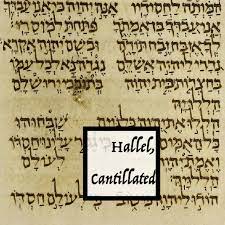 For example, the very hymn that Jesus and the disciples sang as they left the upper room was a part of the Old Testament. Unquestionably, it was the Scripture we now know as Psalms 113-118. This was the traditional hymn called the great Hallel that was sung at the close of the Passover Feast. Hallel is the Hebrew for "Praise to God" and these psalms focus on one theme: Hallelujah. It is significant that the closing verse of the great Hallel includes these words, "Bind the festal sacrifice with cords to the horns of the altar," (Psalms 118:27b NASB)
For example, the very hymn that Jesus and the disciples sang as they left the upper room was a part of the Old Testament. Unquestionably, it was the Scripture we now know as Psalms 113-118. This was the traditional hymn called the great Hallel that was sung at the close of the Passover Feast. Hallel is the Hebrew for "Praise to God" and these psalms focus on one theme: Hallelujah. It is significant that the closing verse of the great Hallel includes these words, "Bind the festal sacrifice with cords to the horns of the altar," (Psalms 118:27b NASB)
As they sang those words, they left the upper room and made their way down across the darkness of the Kidron Valley, into the shadows of Gethsemane's garden. And, as they went, Jesus quoted from the prophecy of Zechariah. He said to them, "You will all fall away; for it is written, 'I will strike the shepherd, and the sheep will be scattered.'" In my earlier study in the book of Hebrews entitled, What More Can God Say?, I say that in my understanding Jesus did not expect what would happen in the Garden of Gethsemane. But in studying through this passage anew, I must repudiate that statement. Before, I had not seen clearly how this passage in Zechariah was intended to be a prediction of Jesus' struggle in the Garden of Gethsemane, as it clearly is. Zechariah had predicted that Jehovah would say,
"Strike the Shepherd that the sheep may be scattered," (Zechariah 13:7b RSV).
Now when Jesus quoted this he changed it from the imperative mode, "Strike the Shepherd," to the indicative, "I will strike the Shepherd." The words come from the lips of God himself. The full verse says,
"Awake, O sword, against my Shepherd,
against the man who stands next to me,"
says the Lord of hosts. (Zechariah 13:7a RSV)
The result of that smiting would be the scattering of the sheep. Now in Matthew's account of this, Jesus adds "this night you will all fall away because of me this night; for it is written, 'I will strike the Shepherd,'" (Matthew 26:31). Therefore it is very clear that Zechariah was predicting the Garden of Gethsemane. Gethsemane's struggle was the smiting of the Shepherd, and the result would be the scattering of the sheep. You can see how true that is if you look forward a bit to Verse 50, where it says of the disciples, "And they all forsook him, and fled," (Mark 14:50 RSV). This is the scattering of the sheep. Jesus did understand what was to happen that night in the Garden of Gethsemane.
He is still thinking of himself as the shepherd when he says these words to the disciples, "But after I am raised up, I will go before you to Galilee." Remember in John 10, where Jesus says, "I am the good shepherd. The good shepherd lays down his life for the sheep," (John 10:11 RSV). He says of this shepherd, "When he has brought out all his own, he goes before them," (John 10:4a RSV). He is reassuring his disciples that after the dark event of Calvary, there will come the glory of the resurrection. He will go before them as the shepherd, still guarding his flock, still watching over them, and he will meet them again in Galilee.
It is interesting to think that never once did Jesus speak of his cross to these disciples without setting it against the dawning light of the resurrection. And yet they never seemed to grasp it. Not one of them believed Jesus would be raised from the dead. I think that because they did not want to hear about his death, they would not believe in his resurrection. And so, though he tried to comfort them, his words were of no avail at that moment.
The second thing to note about this passage is the confident bravado of Peter and the disciples. Peter said to Jesus, "Even though they all fall away, I will not." Notice the contrast between "they" and "I." "They will all deny you," Peter said. "I know these fellows, Lord, and you can't trust a one of them! They'll all deny you, you're right about that! But, Lord, you're wrong about me. I will not!" Peter is confident that he will not do what the rest will do. He is not at all hesitant to point out that he expects the others to fall, but it is going to be different with him.
But Jesus saw far more clearly than Peter. He saw that Peter's confidence was resting upon his own human determination, his own will, and Jesus knew the weakness of it. So he said to him, "Truly, I say to you, this very night, before the cock crows twice, you will deny me three times." It is interesting to see how Jesus narrows down the time. Literally, in the Greek, he says three things. He says, "Truly, I say to you, today..." Then he narrows it further, "this very night", and still further, "before the cock crows twice." In just a few hours, Peter, all that firm resolve, all that confident arrogance, all that clenched-fist determination you have manifested in saying you will not deny me, is going to melt away, leaving you with no ability to stand. And it will happen before these few hours have passed.
I am always amazed by the symbols that Jesus employs. They are so apt, so characteristic. And here is the symbol that he employs to depict this arrogance and confidence of Peter and the other disciples: that of a cock, a rooster. It stands forever as a symbol of an attitude like Peter's. We speak of somebody who is cocksure. We call somebody who is almost arrogantly confident "cocky." These terms come from this story about Peter and the symbol Jesus employed. He does not say this, but I am sure he intended for Peter to think about the fate of most cocks. They lose their heads.
So Peter insisted that Jesus was wrong. He said vehemently, "If I must die with you, I will not deny you. Lord, I'm prepared to go the whole way! How can you say I will deny you when I am ready, yea, even eager, to give up my life for you?" Peter is so sure that Jesus is wrong.
Have you ever felt that way? I have. I have been so sure that something the Word says could not happen. I have been sure that by sheer determination and force of will I could work it out on my own. I have said the same thing Peter did, and so have you. Jesus says the next time you think like this, just remember that cocky little rooster you saw strutting around in the barnyard. That's the same rooster you had for dinner last week!
Now back to Gethsemane, Verse 32:
And they went to a place which was called Gethsemane; and he said to his disciples, "Sit here, while I pray." And he took with him Peter and James and John, and began to be greatly distressed and troubled. And he said to them, "My soul is very sorrowful, even to death; remain here, and watch." And going a little farther, he fell on the ground and prayed that, if it were possible, the hour might pass from him. And he said, "Abba, Father, all things are possible to thee; remove this cup from me; yet not what I will, but what thou wilt." (Mark 14:32-36 RSV)
Here begins the terrible smiting Zechariah had predicted. Jehovah called for a sword: "Awake, O sword, against my shepherd. I will strike the shepherd, that the sheep may be scattered," (Zechariah 13:7a). God would do it himself; he would strike his own shepherd, "this man who is my fellow," and the sheep would be scattered. Now a sword is an instrument designed to sever, to separate. I think that figure explains why here, for the first time in the ministry of our Lord, we have the sense of division between Jesus and the Father. This separation is manifested when Jesus says, "Not my will, but thine be done." Up to this point in our Lord's ministry he knew clearly that he was going to the cross. But this is the first sign that he was not willing and ready to go to the cross. He spoke of it, he understood what it would involve, yet before this point there is no indication that he was in any way reluctant to go. He had said, "I delight always to do those things that please the Father," (John 8:29). Even though it involved some degree of hardship or difficulty for him, he wanted to do it. In the same way, a young man is challenged to do a dangerous or arduous task, and delights to do it, though it costs him greatly. So Jesus went toward the cross with a confident sense that he was in the Father's will. And though it would be hard and dangerous and difficult, yea, even deadly, he was willing to do it.
 Now all is changed. Suddenly, and it seems to be for the very first time, Jesus does not want to do what the Father wants him to do. There is a sense of distance, of deviation. This is why there came upon his spirit this deep sense of struggle, distress. The disciples sense this, and he does not try to hide it from them. He says to them, "My soul is deeply sorrowful within me, even to the point of death." Now very few of us have ever stood at the place where we were so troubled, so hurting within, so deeply distressed that we feared it might take our life. But Jesus was. There was this unwillingness to do the Father's will, even though he knew it was inevitable. He prays, "Father, if it be possible, let this cup pass from me."
Now all is changed. Suddenly, and it seems to be for the very first time, Jesus does not want to do what the Father wants him to do. There is a sense of distance, of deviation. This is why there came upon his spirit this deep sense of struggle, distress. The disciples sense this, and he does not try to hide it from them. He says to them, "My soul is deeply sorrowful within me, even to the point of death." Now very few of us have ever stood at the place where we were so troubled, so hurting within, so deeply distressed that we feared it might take our life. But Jesus was. There was this unwillingness to do the Father's will, even though he knew it was inevitable. He prays, "Father, if it be possible, let this cup pass from me."
There are some who think that the cup refers to the agony of Gethsemane itself. But I do not think so, because at the end of this account, when Jesus is arrested by the soldiers who come with Judas, Peter strikes a sword in his defense. But Jesus says, "Put up your sword, Peter; shall I not drink the cup which the Father has given me?" That cup is still ahead, the cup of agony and terrible separation that he knew awaited him on the cross.
I know there are some Christians who are very troubled by the idea that there ever was a time when Jesus did not want to do the Father's will, and they are upset when you suggest this. A man wrote me a letter just a week or so ago, saying that he was very troubled by statements in my study in Hebrews which said that Jesus did not want to do the Father's will. He says Jesus' statement, "Not my will, but thine," is the acme of perfect and voluntary submission on his part. It is. Jesus does want to do the Father's will, ultimately, and he does choose to obey. But the language is evacuated of its content if you take out all the sense of division and conflict that is in these words, "Not my will, but thine." Jesus did not want to obey. Something within him made him dread it, and we can understand why he did not want to go ahead, why he wanted to escape it. He asked for a way out, "if it were at all possible"; yet he added, "not my will, but thine be done."
I am greatly helped by this trembling on Jesus' part. And I think the account in Hebrews 5 helps us greatly at this point. Hebrews tells us that this agony was so intense, so severe, that as Jesus fell upon his face, blood was forced from his veins by the agony and pressure within, so that his sweat fell in great drops of blood upon the ground. His mouth was opened in involuntary cries of anguish. Hebrews 5:7 says that with strong crying and tears he pleaded with his Father, the one who was able to save him from death; and he was heard. I think that is why Luke's account says an angel appeared to strengthen him. He was heard for his godly submission. Hebrews 5:8 says, "Although he was a Son, he learned obedience through what he suffered." That is the meaning of this smiting of the shepherd in Gethsemane. Hebrews tells us, "For we have not a high priest who is unable to sympathize with our weaknesses, but one who in every respect has been tempted as we are, yet without sinning," (Hebrews 4:15 RSV). If he had never felt that divergence of will, that unwillingness to do what he ought to do because the Father wanted it, he could never have sympathized with me, because in my weakness I am frequently unwilling -- and so are you. Jesus did not want to do what the Father wanted him to do. He had to compel himself to go on. And he did it by casting himself anew upon his Father's enabling strength. That is what his prayers in Gethsemane mean. There is much of mystery here. I can go no further into it than that. But yet I see tremendous help here for those of us who struggle with the will of God.
There is in this congregation a young couple who separated from one another some years ago, when they were first married. They had a little baby. But after an angry session, the young man took off and left his family. I talked with him at that time and he told me he hated his wife and she hated him. He did not want to go back -- ever. We talked a bit about the responsibility he had as a Christian, but he rejected it and went off angry and distressed. But the Spirit of God spoke to him and made him aware that he could not expect God's blessing on his life, or any happiness, if he deliberately refused to obey what God told him to do. So, with every fiber of his being shrieking out against it, he determined that he would obey God and go back to his wife and baby. It was not easy to do, but he did it. And he found that God had done a similar work in his wife's heart, so they came back together with some degree of humility and a willingness to work it out. Gradually God restored the home and this couple's love for one another. They are still members of this church family and have a beautiful marriage. The husband said he knew he had to go back to his family, though it was contrary to every feeling he had. Jesus understands that.
And there will come a time when, no matter what the Word of God says, you do not want to obey. And as Jesus himself has shown us by example, the answer is to cast ourselves afresh upon the mercy and grace of God, knowing that if God does not go with us, it won't work. But we determine to obey on the basis of God's character.
In Verses 37-42 we see the ease with which Peter's fierce resolve and determination is overcome.
And he came and found them sleeping, and he said to Peter, "Simon, are you asleep? Could you not watch one hour? Watch and pray that you may not enter into temptation; the spirit indeed is willing, but the flesh is weak." And again he went away and prayed, saying the same words. And again he came and found them sleeping, for their eyes were very heavy; and they did not know what to answer him. And he came the third time, and said to them, "Are you still sleeping and taking your rest? It is enough; the hour has come; the Son of man is betrayed into the hands of sinners. Rise, let us be going; see, my betrayer is at hand." (Mark 14:37-42 RSV)
The enemy has very little struggle with Peter. It is not even necessary to threaten to throw him to the lions or burn him at the stake. His resolve collapses by the simple expedient of making him too sleepy to pray. That is all; and that tremendous determination of will, that firm resolve, dissolves, and Peter is as weak as putty when the moment comes. He is weak because he lacks the strengthening of prayer. The devil only had to make him sleepy, that is all. I am sure this was a satanic attack. The sword Jehovah was wielding, and which hurt and distressed the Son of God, was now affecting the disciples, and Satan was allowed to appear as a stealthy sandman, dropping sleep into their eyes. So they fell asleep instead of praying.
Jesus analyzes the situation. He comes and finds them and there is almost a touch of humor here. After he wakes them up, he says to these disciples, "Peter, couldn't you watch one hour? Couldn't your resolve and fierce determination last at least that long?" Then he tells us why Peter could not do it. "The spirit is willing, Peter, I know your heart. I know you love me. Your spirit is perfectly willing. But Peter, you relied upon your flesh. The flesh is weak."
We have all felt this, have we not? We have been asked to do something and we say, "The spirit is willing, but the flesh is ready for the weekend." The flesh is weak. Jesus says that is the nature of the flesh. That human sense of independence, the confidence we have in ourselves, is always weak in the hour of testing. It cannot stand the test. Jesus said the same thing in Matthew 7 using another example, that of building a house: "He that hears my word and does my will is like the man who builds his house upon a rock. But he who hears my word and forgets it is like the man who builds his house upon the sand," (Matthew 7:24-27). In the hour of testing, the house built upon the sand will collapse. It cannot stand the test. The spirit that is confident it can carry through on the basis of sheer grit and determination is going to fail. The arm of flesh will fail you.
This is the analysis Jesus gives of Peter's problem. The key is prayer. If Peter, like Jesus, feeling sleepy and weak, had cast himself upon the Father and had told him the problem, the Father would have carried him through, and he would not have denied his Lord.
You see, it is our weakness that is our security, not our strength. That is why I am not terribly impressed when young people tell me how much they are going to do for God and how certain they are that they can carry it through. I have learned, out of sad experience in my own life as well as by the testimony of Scripture, that in the hour of testing, this self-confidence will all wash away. But I have confidence in the man or woman who says, "I'm scared. I don't think I can do this, but I'm going to try, because God tells me to. I'm looking to him to strengthen me."
Prayer is a simple principle, but what a transformation is obtained in our lives when it is practiced! Prayer -- what a difference it makes!
Just a couple of weeks ago my wife and daughter and I walked around in the great cathedral at Worms, Germany, along the Rhine River. As we walked beneath that imposing Gothic structure, we tried to visualize in our mind's eye that scene so long ago when all the powers of Europe were assembled in that place: the Roman emperor, in all his robes and dignity; the papal delegates, the bishops and archbishops of all the Catholic realms of Europe. It was the most imposing array of power possible on the face of the earth of that day, all gathered in that great cathedral against one lone man, Dr. Martin Luther, on trial for his life. The account tells us that the night before, someone overheard Martin Luther praying and wrote down the words of his prayer. It was a long, rambling, disconnected prayer of a soul in deep distress and fear, crying out to God for help, casting himself anew, again and again, upon the strength of God and reminding himself that there is no source of hope or help except God. All his reliance upon the princes of the German state disappeared. Martin Luther cast himself in naked helplessness upon the grace and sustaining strength of God. I am sure that is why, at that very moment, he received strength to stand and say, "Unless someone can show me from these books and from Holy Scripture the error in my thinking, I will not and cannot recant. Here I stand. I can do no other, God help me!" And though he was condemned as an heretic, it was then that the torts of the Reformation began to spread throughout all of Europe. Nothing could stop the shining forth of the light.
Strength is what prayer provides, and that is what Gethsemane teaches. Jesus prayed when the flesh quailed. And though he sweat drops of blood, he stood firm and did the will of the Father. Peter slept.
When the flesh was bold and confident, Peter slept. And the results are what follows in Verses 43-50.
And immediately, while he was still speaking, Judas came, one of the twelve, and with him a crowd with swords and clubs, from the chief priests and scribes and the elders. Now the betrayer had given them a sign, saying, "The one I shall kiss is the man; seize him and lead him away safely." And when he came, he went up to him at once, and said, "Master!" And he kissed him. And they laid hands upon him and seized him. But one of those who stood by drew his sword, and struck the slave of the high priest and cut off his ear. And Jesus said to them, "Have you come out as against a robber, with swords and clubs to capture me? Day after day I was with you in the temple teaching, and you did not seize me. But let the scriptures be fulfilled." And they all forsook him, and fled. (Mark 14:43-50 RSV)
There are three actions emphasized in that paragraph. First, the kiss of Judas. Mark uses the normal word for kiss, which means "to love," in telling of the arrangement Judas had made with the chief priests. They were to seize the one whom he kissed. But in the actual moment, when Judas carries this out, Mark uses an emphasized form of that word, a word that means a prolonged kiss, a lover's kiss. I do not think there is anything in all the annals of treachery more contemptuous than this kiss of Judas' -- a deliberate, prolonged, apparently loving act, done with cold determination to accomplish his own purpose.
The second emphasis in this paragraph is on Peter's blundering defense. Peter is still trying to make a show of carrying out what he resolved. He grabs the sword and, as the priests and soldiers move in on Jesus, he slashes away. But so poor is his aim that all he does is lop off the ear of the high priest's servant. That is such a beautiful example of the flesh at work! We may strike out in our attempts to carry out our purposes, but all we accomplish is the lopping-off of somebody's ear.
I look back this morning on twenty-five years of pastoral ministry and I am sure that if the symbols of my actions were visibly apparent, you could look back and find lopped-off ears lying all over the place! They are symbols of my attempts to do what I thought was right -- but it was not of the Lord. We have all done this. The glorious thing, Luke tells us, is that Jesus reached out and touched that servant and healed his ear. I am so grateful for the Lord's healing touch on the lopped-off ears that I have been responsible for during my lifetime.
The third action emphasized in this passage is the sudden flight of the disciples. They all forsook him. I am sure this means that, at that moment, after three-and-a-half years, all their confidence that Jesus was indeed the Messiah suddenly forsakes them. They see now that he is nothing but a man. His willingness to give himself over without any resistance into the hands of his enemies and his refusal to defend himself in any way becomes, in their eyes, tantamount to his renunciation of being the Messiah. Now it is every man for himself, and so they flee.
In Luke's account of the resurrection, remember that as two disciples walked along the road to Emmaus, a stranger appeared, a man whom they did not recognize, and they discussed with him the events that had taken place in Jerusalem. They said to him, concerning Jesus of Nazareth, "We had hoped (notice the past tense) that he was the one who would redeem Israel," (Luke 24:21a RSV). Their hope was gone, so they forsook him and fled. And thus the smiting of the shepherd resulted in the scattering of the sheep.
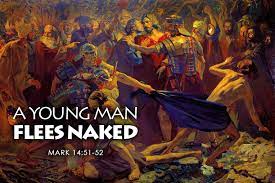 Mark adds a little postscript in Verse 51 that we do not want to miss:
Mark adds a little postscript in Verse 51 that we do not want to miss:
And a young man followed him, with nothing but a linen cloth about his body; and they seized him, but he left the linen cloth and ran away naked. (Mark 14:51-52 RSV)
All the scholars agree that this is Mark himself. This is Mark's way of saying, "I was there." I am sure there are two things at least that he is telling us by this little account of his presence there. At the beginning of this series on the book of Mark, I said that it was my conviction, derived from the Stedmaniac version of Scripture, that Mark himself was the rich young ruler who came to Jesus and asked the way to eternal life. Jesus said to him, "Go, sell what you have ... and follow me," and that young man went away sad, because he had great possessions, (Mark 10:17-22). I think there is some evidence that this was Mark. I believe this incident toward the end of the book is Mark's way of saying, "I did it. I went away and sold all that I had and gave it to the poor. All I had left was a robe. That night I followed him, and in the confusion and abruptness of the arrest, they laid hands on me and I lost even the robe!" And he fled away naked into the night. It is also Mark's way of explaining to us how we got the account of Gethsemane. None of the disciples could have given it. Eight of them were in a part of the garden some distance from Jesus. Three of them were close to him, but they were sound asleep and could not have heard the crying and the prayers; they did not see the angel come and minister to him. But somebody was watching. A certain young man was there watching the whole thing and gave us the story, that we might have hope in the hour of our Gethsemane. This account can help us when we feel that we do not want to do what God tells us to do, and we are confident that somehow we can work it out in our own strength. In that hour, we have Mark's account to remind us that we can come to a throne of grace and find mercy and grace to help in time of need.
Symphony Orchestra. Did your God will this?" For a moment no one answers. Then Corrie Ten Boom steps to the side of her sister and says, in simple words, "We can't answer that question. All we know is that our God came to this earth, and became one of us, and he suffered with us and was crucified and died. And that he did for love." That is what this story is saying to us. This is love's extravagance. When you and I partake of the table of the Lord together, Jesus is saying, "Look, it is I who break the flask of my own body, to pour out upon you all the precious ointment, so that you may understand that it is no longer law which governs your life; it is love."
|

